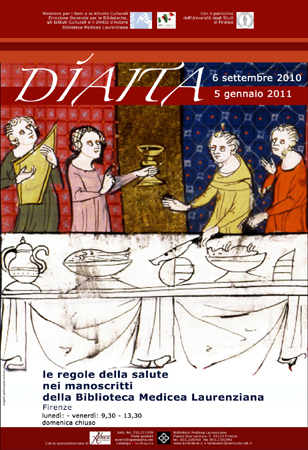
From 6 September 2010 to 5 January 2011 the Library will open the new exhibition “Díaita. Heath rules in the manuscripts of the Biblioteca Medicea Laurenziana” an exposition concerning life style and diet as strategies to ensure physical and mental wellbeing. This is a theme that is fashionable today as it was in the past when in Italy during the age of princely courts and wealthy merchants, the interest of the elite in preserving their health inspired the Regimina sanitatis - the offspring of the classical tradition gradually enriched by contact with the Arab world – contained in the manuscripts on display. The concept of a ‘life regime’ in the classical world was expressed by the term díaita/diaeta (which had nothing to do with adjusting rations according to an individual’s physical and biometric conditions, as it does today). Its meaning was far broader, encompassing all the areas that were not determined automatically by nature and that humans thus could plan of their own accord such as one’s relationship with air and water, food and drink, motion and rest, sleep and wakefulness, dejecta and sexuality, love and passion. Amongst the manuscripts that can be viewed, all from the Biblioteca Medicea Laurenziana, in Latin, Greek or Italian Vernacular and dating from the XII to the XVI centuries, some are particularly interesting: the Treatise on Cooking by Apicius that witnesses the specific importance of eating; the Tacuinum sanitatis by Ibn Butlan; the Regime del Corpo by Aldobrandino da Siena present in different Italian translations one realized in May 1310 by the Florentine notary Zucchero Bencivenni. Important among others is the Compendium of the nature and properties of food by Barnaba from Reggio in a parchment manuscript copied between the 13th and 14th century. “The exhibition is about a type of knowledge that has often survived in traditional medicine..
Copyright © Biblioteca Medicea Laurenziana 2001 – 2016